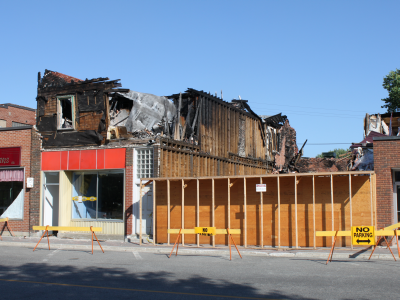Prior to being retained as Espanola’s economic development officer this past January, Colin Wilson concedes he wasn’t overly familiar with the small North Shore community.
“Before coming to this position, I had never really spent much time here,” he said. “Coming from Sudbury, I usually went right through to (Manitoulin) Island, but now that I’m spending time here it’s just unbelievable the amenities this small town has.”
A nine-hole golf course, government services, a recreational complex with a saltwater pool, myriad shopping options and a ski hill have all endeared Wilson to the town, which is poised to become the North Shore’s newest industrial hot spot.
Wilson spent a year tuning up his skills with the Municipality of Central Manitoulin as that community’s EDO before taking the job in Espanola. And before that, armed with degrees in geography and education, Wilson, who hails originally from Sudbury, got his feet wet as a planning assistant with the Manitoulin Planning Board in Gore Bay.
He had just been named to the position in May when the municipality announced it had sold all eight lots in its industrial park to Helios Developments, a renewable energy enterprise run by a pair of entrepreneurs from Lively.
It was a coup for the community of 5,000, which had worked hard over the last few years to prepare the land for shovel-ready projects that would bring industry to the town. Now, the second phase of the industrial park is underway. It will include the development of 15 acres and a new road connecting the park with Highway 17.
The town has completed an environmental assessment for a road extension and municipal services in the industrial park, and a tender has been issued. Wilson expects shovels will be in the ground by late summer or early fall. A marketing campaign will follow once the expansion is open.
Wilson takes over the project from former EDO Anna Frattini, who exited last September. Other projects now under his purview include working with council to put in place a community improvement plan (CIP) to address the town’s lack of seniors’ and affordable housing.
According to a 2009 report released by the Manitoulin-North Shore District Services Board (DSB), Espanola will require 65 private sector retirement housing units and up to 118 housing units over the next 25 years.
“This is a municipal planning and financial tool, and it’s a multi-faceted, multi-pronged policy that allows a municipality to provide certain incentives or remove some of the costs associated with development,” said Wilson.
“In essence, you’re able to attract developers and give them a reason to come to the community.”
The CIP can also be used to develop a downtown revitalization plan, which considers public input in its design. Following a fire earlier this year that gutted two businesses in the downtown core, Wilson believes it's time for people to start thinking about façade improvements and a “cohesive branding” of the downtown core.
“You want that density to be there,” Wilson said. “You notice in a lot of cities you see the direction going to the periphery with these big box stores, and that just pushes people to get in their car and drive all over instead of getting out and walking and experiencing their community. In small towns, I think downtown cores are very important.”
The town is approaching funding agencies to launch the CIP, which will be a provincial-federal-municipal partnership. Though the town wants to be competitive on a regional level, council is also mindful of the municipality’s commitment, looking to minimize any burden on the taxpayers, Wilson said.
Through his connections made on Manitoulin, Wilson wants to bridge the communication gap between Espanola and Whitefish River First Nation, located about 15 minutes to the south.
Wilson said the First Nation is seeking out industrial and commercial opportunities in the area, and he wants a more collegial relationship between the two communities.
“We want the lines of communication to be open so that if there is an opportunity that they’re interested in, we can help them out in any way possible,” he said.




